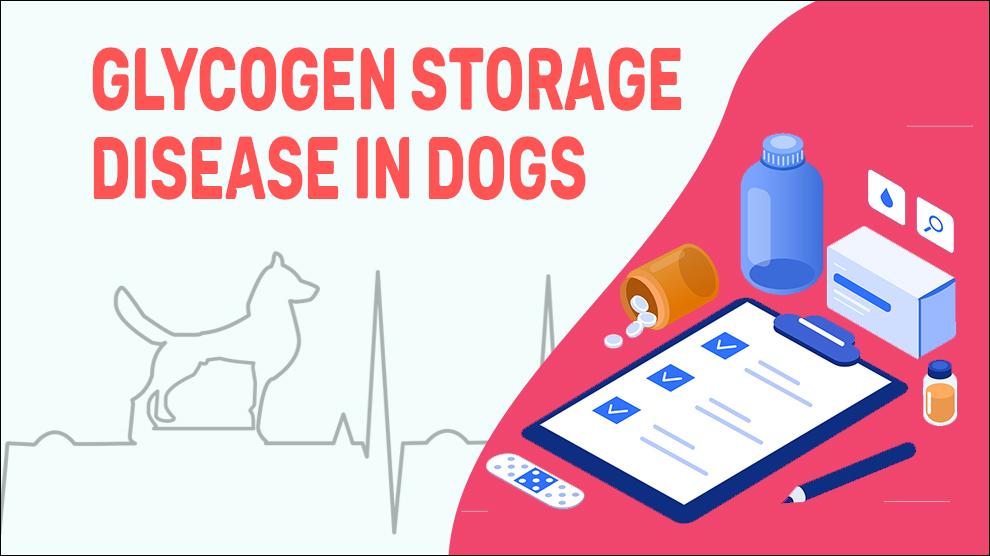What Is Glycogen Storage Disease In Dogs?
Glycogen storage diseases (GSDs) are a group of autosomal recessive congenital metabolic disorders that involves carbohydrate metabolism where the body is unable to properly break down or store glycogen, often referred to as “animal starch”.
Also called Glycogenosis, the conversion of glycogen into glucose (so that the body can use it as fuel) is handled by the enzyme called glucose-6-phosphatase. Sometimes, genetically some puppies are born with this enzyme deficiency. When there is the absence of the glucose-6-phosphatase action, the animal is incapable to generate glucose on its own with respect to changes in blood sugar leading to chronic low blood sugar.
Moreover, as the animal cannot efficiently convert fat and glycogen, both of them build up in the muscle, liver, and kidneys causing damage and hampering the proper function of these organs. The profusion of by-products of glycogen has to be cleared up by dumping the excess somewhere. When the process happens through supplementary metabolic pathways, it can lead to other disorders like elevated triglycerides and lactic acidosis. Dogs with GSD do not usually survive past five months.
The inability to carry out the glucose-freeing step in the metabolic pathway and excess glycogen leads to the accumulation of other metabolites (lipids, triglycerides, lactates, and uric acid), liver damage, and chronic low blood sugar.
Symptoms Of Glycogen Storage Disease In Dogs
Type I-a (Von Gierke’s disease): Low blood sugar (hypoglycemia), failure to thrive, mental depression.
Type II (Pompe's disease): Progressive muscle weakness, cardiac abnormalities, and vomiting.
Type III (Cori’s disease): Mild hypoglycemia, weakness, Depression, and failure to thrive.
Type IV (Andersen disease): Hemolytic anemia, hemoglobinuria.
Treatment Options For Glycogen Storage Disease In Dogs
There is no proper treatment available for GSD.
For the anorexic, nauseated, and systemically ill dogs, hospitalization for supportive therapy such as intravenous fluids might be required.
When immune-mediated complications exacerbate GSD (prednisone, prednisolone, dexamethasone, triamcinolone) and other immunomodulating medications (such as Cyclosporine (CSA), Azathioprine, Mycophenolate mofetil) is provided.
Home Remedies For Glycogen Storage Disease In Dogs
Follow the instructions given to you by your veterinarian for the entire recommended time period.
Proper treatment and careful home care can help dogs with GSD maintain a quality of life for some time.
If any specific diet has been suggested to your dog, follow the diet very strictly, and never provide or allow others to give your dog treats or other food.
How To Prevent Glycogen Storage Disease In Dogs?
Dogs that have GSDs and their litter mates must not be used for breeding. Preferably, all the genetically predisposed breeds (even those without clinical signs) should be carefully examined for GSD before being used in a breeding program. Breaders may use their discretion when GSD appears to be a one-off incident.
Affected Dog Breeds Of Glycogen Storage Disease
- Type I-a: Maltese puppies
- Type II: Lapland dogs
- Type III: Female German Shepherds
- Type IV: English Spring Spaniels
Causes And Types For Glycogen Storage Disease In Dogs
1. Causes:
Idiopathic/inherited
2. Types:
Type I (von Gierke disease):
- A most common form of GSD.
- The enzyme needed to convert glycogen into glucose in the liver is absent.
- Symptoms often within 2 to 4 months.
Type II (Pompe’s disease):
- Deficiency of the lysosomal acid alpha-glucosidase enzyme.
- Death usually occurs before two years of age.
Type III (Cori disease, or Forbes disease):
- The debranching enzyme is absent (breakdown of glycogen).
Type IV or Andersen disease:
- Abnormal glycogen triggers the body’s immune system.
3. Mortality:
GSD has been considered a medical emergency and the mortality rate is still undefined. As GSD affects many organs, it is actually a life-threatening illness.
4. Diagnosis:
- Complete blood count (CBC)
- Biochemical profile
- Ultrasound and CT scan
- X-rays
5. Prognosis:
The cause of GSD is idiopathic and/or congenital. GSD Treatment in dogs usually lasts lifelong. Your vet will periodically re-examine the pet on a regular basis. Regular blood tests will be performed. Most owners euthanize the affected dogs.
When To See A Vet For Glycogen Storage Disease In Dogs?
Contact your vet right away, if you notice any of the following:
- Progressive muscle weakness
- Gastrointestinal upset
Food Suggestions For Glycogen Storage Disease In Dogs
- High carbohydrate diet and Protein (moderate levels of bioavailable protein).
- Appropriately formulated fresh food diet/ A big ‘NO’ to dry foods.
- Leafy greens, fresh vegetables, and antioxidants.
- Add safe dairy products (cottage cheese, ricotta cheese, and yogurt).
- Omega fats: omega-6 and omega-3 in a 4:1 ratio.
- Regulated treats that are part of the daily calorie intake.
- Generally, all ingredients should be fresh, easily digested, highly palatable with a good smell, and should be highly bioavailable.
Conclusion
The treatment provided for GSD is only a short-term measure, and it is extremely rare for dogs afflicted with GSD to survive more than a year. Whatever the form of GSD is, it always progresses and becomes increasingly worse— this means, there is no proper treatment, and the dog gets progressively weaker and dies. Screening of highly affected breeds prior to breeding is strongly recommended.

















